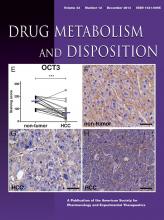Abstract
Methamphetamine (MA), which remains one of the widely used drugs of abuse, is metabolized by the cytochrome P450 (P450) family of enzymes in humans. However, metabolism of methamphetamine in macaques is poorly understood. Therefore, we first developed and validated a very sensitive liquid chromatography with tandem mass spectrometry (LC-MS/MS) method using solid phase extraction of rhesus plasma with a lower limit of quantitation at 1.09 ng/ml for MA and its metabolites, 4-hydroxy methamphetamine (4-OH MA), amphetamine (AM), 4-OH amphetamine (4-OH AM), and norephedrine. We then analyzed plasma samples of MA-treated rhesus, which showed >10-fold higher concentrations of AM (∼29 ng/ml) and 4-OH AM (∼28 ng/ml) than MA (∼2 ng/ml). Because the plasma levels of MA metabolites in rhesus were much higher than in human samples, we examined MA metabolism in human and rhesus microsomes. Interestingly, the results showed that AM and 4-OH AM were formed more rapidly and that the catalytic efficiency (Vmax/Km) for the formation of AM was ∼8-fold higher in rhesus than in human microsomes. We further examined the differences in these kinetic characteristics using three selective inhibitors of each human CYP2D6 and CYP3A4 enzymes. The results showed that each of these inhibitors inhibited both d- and l-MA metabolism by 20%–60% in human microsomes but not in rhesus microsomes. The differences between human and rhesus CYP2D6 and CYP3A4 enzymes were further assessed by docking studies for both d and l-MA. In conclusion, our results demonstrated an enhanced MA metabolism in rhesus compared with humans, which is likely to be caused by differences in MA-metabolizing P450 enzymes between these species.
Footnotes
- Received June 3, 2014.
- Accepted October 8, 2014.
The work was funded by the National Institutes of Health National Institute on Drug Abuse [Grant DA025528 and DA025011] (to A.K.); and the National Natural Science Foundation of China [Grant 81373328] (to W.L.).
↵
 This article has supplemental material available at dmd.aspetjournals.org.
This article has supplemental material available at dmd.aspetjournals.org.
- Copyright © 2014 by The American Society for Pharmacology and Experimental Therapeutics
DMD articles become freely available 12 months after publication, and remain freely available for 5 years.Non-open access articles that fall outside this five year window are available only to institutional subscribers and current ASPET members, or through the article purchase feature at the bottom of the page.
|







